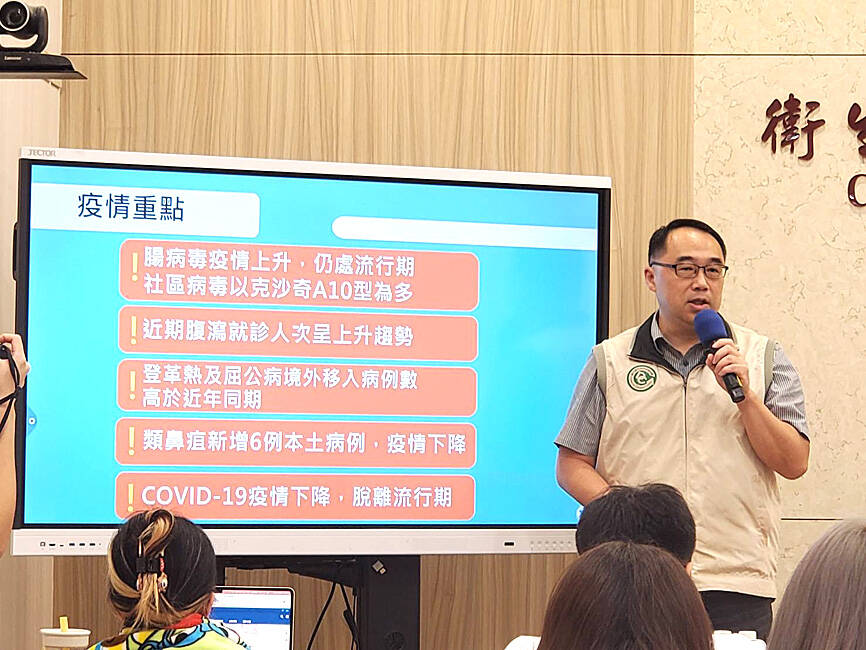Hospital visits for diarrhea and enterovirus infection have been increasing and the trend is expected to continue next month, as schools restart this week, the Centers for Disease Control (CDC) said yesterday.
CDC Epidemic Intelligence Center Director Guo Hung-wei (郭宏偉) said that 13,701 hospital visits for enterovirus infection were reported last week, a rise of 5.8 percent from the previous week and the second week of increases.
Surveillance data from labs showed that the most common enterovirus strain detected in the past four weeks was coxsackievirus A10, followed by coxsackievirus A16, Guo said.

Photo: Lin Hui-chin, Taipei Times
Among the cases reported last week, two people had enterovirus D68, a strain that can cause severe acute respiratory illness, he said, adding that the two people had mild symptoms.
Sixteen mild cases of enterovirus D68 have been reported so far this year, he said.
CDC Deputy Director-General Philip Lo (羅一鈞) said that enterovirus infection levels have remained in the epidemic range throughout the summer.
As weekly numbers have increased for two weeks and with elementary and high-school classes starting on Friday, cases are expected to continue increasing next month, Lo said.
Enterovirus infections in Taiwan tend to have a large wave from spring to before summer vacation and a smaller wave in autumn after schools start, with the second wave peaking around the Mid-Autumn Festival, he said.
If the trend holds, enterovirus infections would continue to increase after schools start and possibly decrease after the Mid-Autumn Festival, which falls on Sept. 17 this year, the CDC said.
Guo said that 125,895 hospital visits for diarrhea were reported last week, the second-highest weekly number for the period in 10 years.
Weekly numbers have increased for four consecutive weeks, he said.
CDC data showed that 79 clusters of diarrhea cases were reported in the past four weeks.
Of the 37 clusters from which pathogens had been identified, 56.8 percent were norovirus and 32.4 percent had the Vibrio parahaemolyticus bacteria.
“Hospital visits for diarrhea often peak around the Mid-Autumn Festival, usually because people undercook meat when barbecuing during the holiday or because they eat contaminated seafood,” Lo said.
With school starting and the Mid-Autumn Festival next month, people should wash their hands frequently and thoroughly, pay attention to restaurant sanitation, and cook meat and seafood thoroughly before eating, the CDC said.
The recent diarrhea cases were mainly caused by viral pathogens, which usually cause vomiting, especially in children, as well as abdominal pain, nausea, diarrhea and fever, Lo said, adding that people usually recover on their own, but they should drink water or other fluids that have electrolytes to prevent dehydration.
People can transmit the illness up to two weeks after their symptoms have subsided, so they should still practice good hand hygiene and disinfect the home environment, he added.
In addition, the CDC said that six imported cases of dengue fever and three cases of chikungunya were reported last week.
Six new local cases of melioidosis were reported in Kaohsiung last week, bringing the total this year to 60, of which 53 were reported after Typhoon Gaemi struck Taiwan last month, it said.
Hospitalizations for COVID-19 have been below the epidemic threshold for two consecutive weeks, so the epidemic period has ended, it added.

Taipei and New Taipei City government officials are aiming to have the first phase of the Wanhua-Jungho-Shulin Mass Rapid Transit (MRT) line completed and opened by 2027, following the arrival of the first train set yesterday. The 22km-long Light Green Line would connect four densely populated districts in Taipei and New Taipei City: Wanhua (萬華), Jhonghe (中和), Tucheng (土城) and Shulin (樹林). The first phase of the project would connect Wanhua and Jhonghe districts, with Chiang Kai-shek Memorial Hall and Chukuang (莒光) being the terminal stations. The two municipalities jointly hosted a ceremony for the first train to be used

MILITARY AID: Taiwan has received a first batch of US long-range tactical missiles ahead of schedule, with a second shipment expected to be delivered by 2026 The US’ early delivery of long-range tactical ballistic missiles to Taiwan last month carries political and strategic significance, a military source said yesterday. According to the Ministry of National Defense’s budget report, the batch of military hardware from the US, including 11 sets of M142 High Mobility Artillery Rocket Systems (HIMARS) and 64 MGM-140 Army Tactical Missile Systems, had been scheduled to be delivered to Taiwan between the end of this year and the beginning of next year. However, the first batch arrived last month, earlier than scheduled, with the second batch —18 sets of HIMARS, 20 MGM-140 missiles and 864 M30

Representative to the US Alexander Yui delivered a letter from the government to US president-elect Donald Trump during a meeting with a former Trump administration official, CNN reported yesterday. Yui on Thursday met with former US national security adviser Robert O’Brien over a private lunch in Salt Lake City, Utah, with US Representative Chris Stewart, the Web site of the US cable news channel reported, citing three sources familiar with the matter. “During that lunch the letter was passed along, and then shared with Trump, two of the sources said,” CNN said. O’Brien declined to comment on the lunch, as did the Taipei

A woman who allegedly attacked a high-school student with a utility knife, injuring his face, on a Taipei metro train late on Friday has been transferred to prosecutors, police said yesterday. The incident occurred near MRT Xinpu Station at about 10:17pm on a Bannan Line train headed toward Dingpu, New Taipei City police said. Before police arrived at the station to arrest the suspect, a woman surnamed Wang (王) who is in her early 40s, she had already been subdued by four male passengers, one of whom was an off-duty Taipei police officer, police said. The student, 17, who sustained a cut about